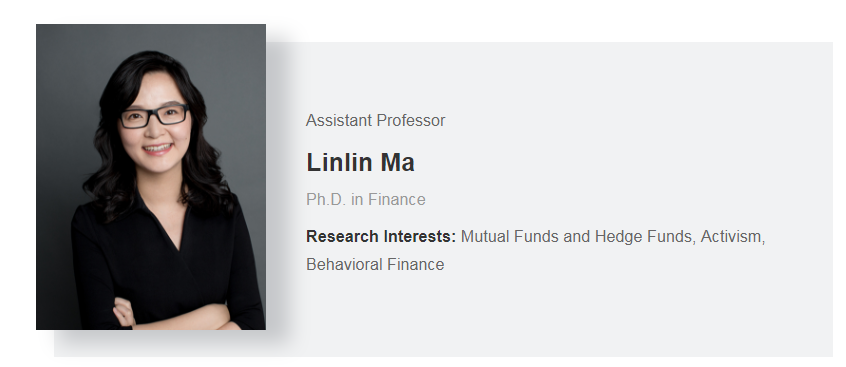The Principal Agent Problem, one of the most noticed issues in daily economic activities, arises when a person has been granted decision-making power (agent) for someone else (principal), which can result in creating moral dilemmas and conflicts of interest. Ultimately, the principal incurs the cost. For instance, mutual funds are professionally managed investment vehicles that are designed to meet specific risk–return needs of investors. While your portfolio manager should, technically, look out for your best interests, there is mounting evidence to suggest this may not always be the case.

If you are one of the millions who invest in a mutual fund, how can you be sure that fund managers are going to make the best decisions regarding your investment? One simple way, according to new research by PHBS Associate Professor Ma Linlin and her coauthor University of Florida Assistant Professor Tang Yuehua , is to find a portfolio manager who invests their own money in the fund they manage. More simply, finding a portfolio manager with “skin in the game” is beneficial for you as an investor. The paper titled “Portfolio Manager Ownership and Mutual Fund Risk Taking” has been recently published in the Management Science, an internationally renowned academic journal.
While vetting portfolio managers might sound like a lot of work, Tang and Ma suggest it is easier than you might expect. Since 2005, the U.S. Securities and Exchange Commission has required mutual funds to disclose portfolio mangers’ ownership stakes in the fund. Using this information, Tang and Ma collected data on portfolio manager ownership of 1,610 actively managed U.S. domestic equity mutual funds from 2007-2014. “We find that about 70 percent of our funds sampled have at least one portfolio manager co-investing in the fund, with an average stake of about $540,000,” Tang and Ma write.
Analyzing mutual funds’ portfolio rebalancing behavior, Tang and Ma constructed measures that capture managers’ intended changes in portfolio risk. They found that both intra-year and across-year risk change measures decrease as managerial ownership increases, meaning, “Portfolio managers with greater ownership stakes in their funds, ceteris paribus, are associated with greater reduction of risk taking in the subsequent period,” they write.
Tang and Ma also found that the effect of ownership on risk reduction is particularly strong among portfolio managers with high agency issue-induced risk-taking incentives, like managers who face a more convex flow-performance relation, have poor performance, or are not compensated based on long-term fund performance by the fund management company. “All these findings suggest that the main mechanism of ownership’s impact on risk reduction is through mitigating managers’ agency-induced risk-taking behavior,” the researchers write.
While the mutual fund industry has been shown to have excessive amounts of risk-taking among portfolio managers which hurt investors’ welfare, Tang and Ma suggest that the best way to make sure your portfolio continues to produce the returns you desire is to find a manager that invests in the fund they manage. They suggest that fund managers having skin in the game isn’t just something that benefits investors, but also is a practice that funds should strongly encourage, if not require.
 By Ma Linlin
Edited by Priscilla Young
By Ma Linlin
Edited by Priscilla Young










